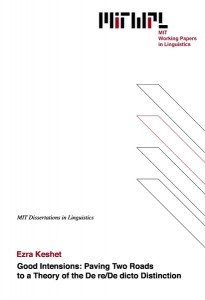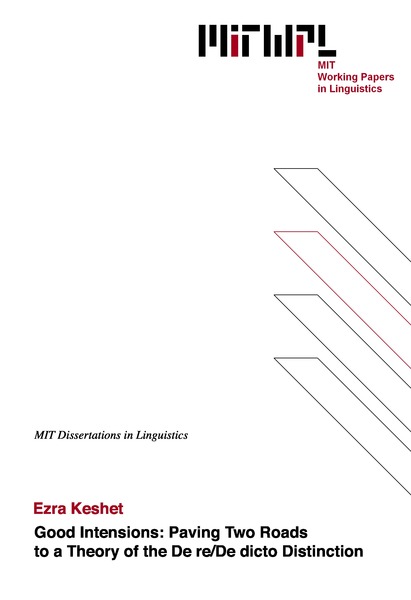Good Intensions: Paving Two Roads to a Theory of the De re/De dicto Distinction
Ezra Keshet, 2008
ABSTRACT
The main goal of this dissertation is to determine the best theory of de re/de dicto intensionality. Recently, it has become apparent that the traditional scope theory of this phenomenon is inadequate, the most marked evidence for this being the scope paradoxes discussed in Fodor (1970), B¨auerle (1983), and Percus (2000). This work therefore discusses two theories designed to replace the traditional theory. The first such replacement is the situation pronoun theory, which posits covert pronouns in the syntax of natural language representing pairs of worlds and times. This theory overgenerates, though, in several areas where the scope theory does not. These are discussed in terms of several generalizations captured by the latter but not the former. First, extending work by Musan (1997), the Intersective Predicate Generalization (IPG) states that two nodes combined via Predicate Modification must be evaluated at the same world and time. To capture this generalization in the situation pronoun theory, a rule of Situation Economy is proposed, which favors natural language structures having fewer situation pronouns. However, three more generalizations are next discussed, based on and extending work by Percus (2000): Generalizations X, Y, and Z rule out de re readings for VPs, adverbs, and the head nouns of weak NPs, respectively. Proposals to capture these generalizations by Shimada (2007) and Schueler (2007) are discussed. The last chapter of the dissertation raises several new ways in which the situation pronoun theory predicts unattested readings of intensional sentences. These cases, involving island constraints, polarity items, and subconstituents of DPs, are all captured under the scope theory. Therefore, a second replacement for the scope theory is proposed, which represents a more modest departure. The split intensionality system separates each intensional operator’s quantificational force from its intensional force, by use of a new operator, ∧ after Montague (1970). Although further work is required, this new system preliminarily seems able to solve the problems with the traditional theory without overgenerating as the situation pronoun theory does.
Thesis Supervisor: Irene Heim

